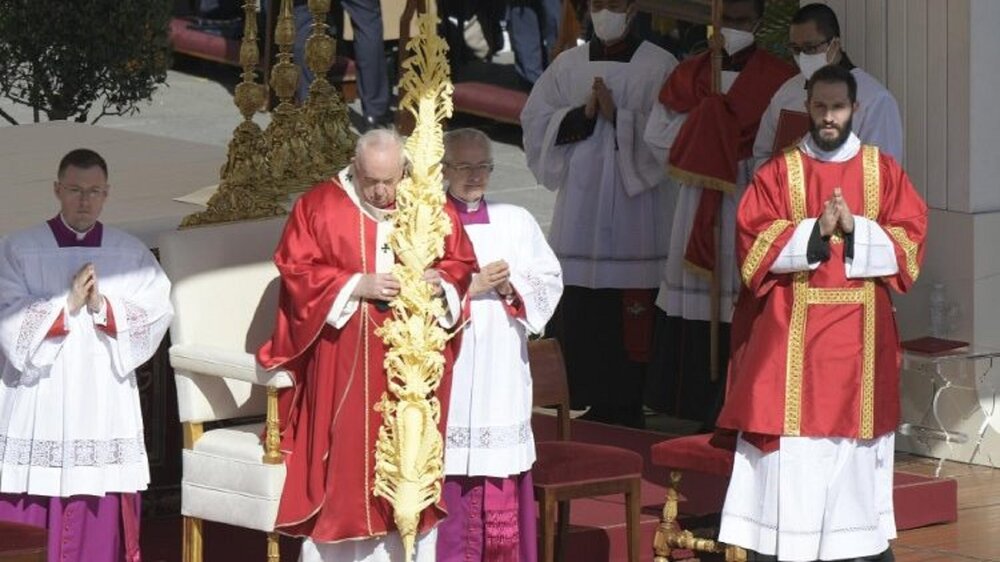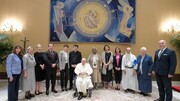Hawzah News Agency – Pope Francis underscored this during his homily on Palm Sunday, insisting that no matter how dire a situation may be, it is never too late to begin again since the Lord waits for us with His mercy.
The Pope presided over the liturgy of Palm Sunday of the Lord’s Passion in St. Peter's Square, marking the first time since the outbreak of the coronavirus pandemic that the Holy Father could lead the celebration among numerous masked faithful outdoors, rather than from inside St. Peter's Basilica with very limited numbers permitted to protect against contagion.
'Father, forgive them'
The Holy Father began his homily remembering how on Calvary, "two ways of thinking collided." In the Gospel, the Pope observed, the crucified Jesus' words of forgiveness are in sharp contrast with those who crucified Him, who kept saying to Christ: “Save yourself.”
The Pope highlighted how God’s way of thinking goes against this self-centred suggestion, noting, "The mantra save yourself collides with the words of the Saviour who offers His self." The Lord did not defend or justify Himself. Rather, He prayed to the Father, offered mercy to the good thief, and said: “Father, forgive them” amid "the most searing physical pain" of His Passion.
At times like that, the Pope pointed out, "we would scream out and give vent to all our anger and suffering. But Jesus said: Father, forgive them."
Jesus, the Pope recalled, did not rebuke His executioners or threaten punishments in the name of God, but rather prayed for the evildoers. The Pope then said that God does the same with us.
"Let us look to Jesus on the Cross," the Pope said, and "realize that we have never been looked upon with a more gentle and compassionate gaze" nor ever "received a more loving embrace."
The Pope invited faithful to look at the crucified Lord and say: "Thank you, Jesus: you love me and always forgive me, even at those times when I find it hard to love and forgive myself.”
Jesus asks to break vicious cycle
"Let us think about someone who, in our own lives, injured, offended or disappointed us; someone who made us angry, who did not understand us or who set a bad example," the Pope invited, saying, "How often we spend time looking back on those who have wronged us!"
Today, the Holy Father insisted, "Jesus teaches us not to remain there, but to react, to break the vicious circle of evil and sorrow."
God, the Pope reminded, "sees a son or a daughter in each person." The Lord, he insisted, does not separate us into good and bad, friends and enemies. "We are the ones who do this, and we make God suffer."
Never tires of forgiving
According to the Gospel, the Pope remembered, Jesus did not say to forgive those crucifying Him once as He was being nailed to the Cross, but spent all His crucifixion with these words on His lips and in His heart.
"Let us never grow tired of proclaiming God’s forgiveness: we priests, of administering it; all Christians, of receiving it and bearing witness to it," the Pope said.
In folly of war, Christ crucified again
Those who crucified Christ, the Pope observed, had premeditated His killing, organized His arrest and trials, and now they were standing on Calvary to witness His death. Regardless, he stated, Christ justifies those violent men by saying that "they know not."
This, the Holy Father explained, "is how Jesus acts in our regard: He makes Himself our advocate. He does not set Himself against us, but for us and against our sins." These words make us think, the Pope said.
"When we resort to violence," the Pope continued, "we show that we no longer know anything about God, who is our Father, or even about others, who are our brothers and sisters. We lose sight of why we are in the world and evFhimen end up committing senseless acts of cruelty."
"We see this in the folly of war, where Christ is crucified yet another time," the Pope said.
'You will be with me in Paradise'
The Pope reminded that only one person responded to Jesus' invitation to leave the past and start new while Jesus was on the Cross, namely "a criminal," crucified next to Jesus, who said "Jesus, remember me."
"The good thief accepted God as his life was ending, and in this way, his life began anew," the Pope said. "In the hell of this world, he saw heaven opening up: 'Today you will be with me in Paradise.'" This, the Pope said, is the marvel of God’s forgiveness, "which turned the last request of a man condemned to death into the first canonization of history."
With God, it is never too late
During Holy Week, the Holy Father said, "let us cling to the certainty that God can forgive every sin, bridge every distance, and turn all mourning into dancing. The certainty that with Jesus, there is always a place for everyone. That with Jesus, things are never over. That with Him, it is never too late. "
The Holy Father concluded by inviting faithful to journey toward Easter with His forgiveness, certain that Christ constantly intercedes for us before the Father.
"Gazing upon our violent and tormented world," Pope Francis said, Jesus "never tires of repeating: 'Father, forgive them for they know not what they do.'"




Your Comment